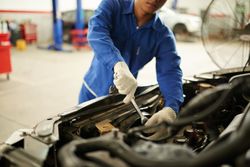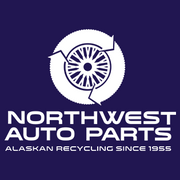
Even if you’re not a car enthusiast, you likely have heard that the transmission is one of the most important parts of your vehicle. While you may know that keeping it in top shape is a high priority, do you understand why? Below is a guide to how the transmission works so that you can better care for your car.
What Does a Transmission Do?
The transmission is the part of the vehicle that converts the engine’s force into a power source. It communicates this power to the wheels so the car can move. This conversion is called torque, or rotational force, and it’s what makes the axles turn so the wheels can roll.
The transmission balances the power from the engine to the axles by way of gears. These gears interact with each other based on the desired speed. They also work together to shift when the speed changes or if the car switches between neutral, reverse, and park.
What’s the Difference Between Manual & Automatic?
 The two types available are manual and automatic. In a manual, the driver physically shifts the gears, while an automatic doesn’t need any assistance. Instead, the gears shift on their own by way of fluid pressure that activates the gears for different speeds.
The two types available are manual and automatic. In a manual, the driver physically shifts the gears, while an automatic doesn’t need any assistance. Instead, the gears shift on their own by way of fluid pressure that activates the gears for different speeds.
Automatics are easier to operate and are currently more popular nationally. They are also easier to repair due to available auto parts, but they may require more maintenance than their manual counterparts.
Manuals are less popular, but they do require less maintenance. The driver is more in control of the car, and these vehicles tend to be more fuel efficient. Manuals require more practice to operate than an automatic that can just be put into drive.
What Are Some Common Issues?
When drivers don’t keep up with regular maintenance, they may encounter transmission trouble, particularly if the fluid needs to be flushed and changed. Without fluid, components aren’t properly lubricated, leading to excessive wear and tear.
If a transmission needs service, drivers will often feel grinding or shaking, or they may smell a burning odor. Often, these issues are a result of slipping gears or low or leaking fluid.
When your transmission needs quality components, trust the auto parts dealers at Northwest Auto Parts. Located in Anchorage, AK, they are the area’s top salvage yard for anyone looking for quality car parts, tires, and engine components. For nearly 40 years, their team has helped residents with unloading their junk cars and ensuring that vehicles are properly recycled. For more on their offerings, call (800) 770-6531. Stop by their website for their helpful FAQ.
About the Business
Have a question? Ask the experts!
Send your question

